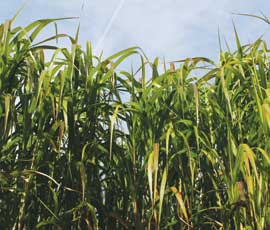Miscanthus grow and buy-back scheme launched

Farmers and landowners are being offered the chance to sign up to a special dual contract miscanthus grow and buy-back scheme.
Miscanthus growing company and energy pellet supplier, Terravesta’s Grower Fuel Loop, allows farmers on growing contracts to buy back Miscanthus pellets for biomass, from up to 50% of their area under crop, at a discounted price.
Growers will be offered two separate 10-year RPIX-linked contracts – one for growing and one for buying back pellets – with pellets available from the first day of planting, said Terravesta chairman William Cracroft-Eley.
Miscanthus crop takes two years to establish and only reaches full maturity in years four or five, offering yields of up to 14t/ha, he said.
“In a volatile energy market with soaring prices, farmers with substantial heat requirements – be these on-farm, domestic or for a separate commercial enterprise – are under increasing pressure,” added Mr Cracroft-Eley.
The Grower Fuel Loop offered farmers the chance to secure biomass supply on fixed pricing for a whole decade, offering a cost-effective alternative to oil and solid fuel, he said.
The 2013 delivered price on grower contracts was £70.04/t at 16% moisture and below, but the company would accept up to 23% moisture with a penalty of up to £13/t, said Mr Cracroft-Eley.
Pellets supplied on an energy contract, through the Grower Fuel Loop, were charged based on heat used at around 5p/kWh – 1-1.5p/kWh cheaper than standard pellet prices, he added.
However, the price depended on delivery method, frequency of delivery and distance, with the amount of heat used recorded on the farm’s biomass boiler heat meter, he said.
Terravesta was particularly interested in recruiting growers in the East Midlands and East Anglia but it welcomed growers from across the country. There was also the option to sign up to a sole grower or energy supply contract, rather than going for the dual Grower Fuel Loop option, said Mr Cracroft-Eley.
“Across the UK there is potential for a massive 350,000ha of suitable planting land, which would produce around five million tonnes of Miscanthus,” added Mr Cracroft-Eley.
“A yield of this size could generate enough sustainable energy to meet 24% of the heat demand currently being fulfilled using oil and solid fuel in the UK, all at no detriment to food supply.”
